Roundworm
(15%-25%)3,4
Parasite prevalence
In dogs, three of the most frequently diagnosed intestinal parasites are:
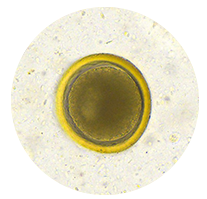
(15%-25%)3,4
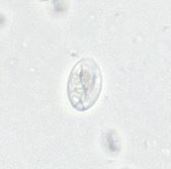
(3%-8.4%)1,5
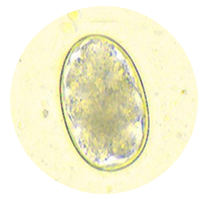
(1.2%-3.75%)3,6
High definition images are from VETSCAN IMAGYSTTM.
In cats, two of the most frequently diagnosed intestinal parasites are:
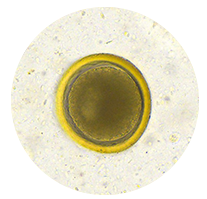
(26%)6

(3%-7%)5
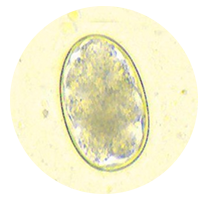
(3.9%)6
High definition images are from VETSCAN IMAGYSTTM.
Testing guidelines
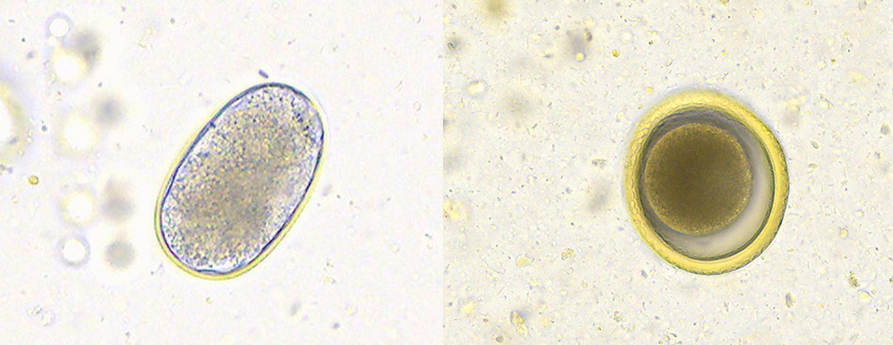
High definition images are from VETSCAN IMAGYST.
Current shortcomings

Level of staff training

Time spent practicing, preparing and reading faecal results

Less time preparing the sample or reading results due to other responsibilities in the practice
by passive faecal flotation examinations done in private practice due to clinician error or limitations of the passive flotation technique10
References: 1. Batchelor DJ, Tzannes S, Graham PA, Wastling JM, Pinchbeck GL, German AJ. Detection of endoparasites with zoonotic potential in dogs with gastrointestinal disease in the UK. Transbound Emerg Dis. 2008;55(2):99-104. doi: 10.1111/j.1865-1682.2007.01005.x. PMID: 18397497.
2. Traversa, D. Pet roundworms and hookworms: A continuing need for global worming. Parasites Vectors 5, 91 (2012). https://doi.org/10.1186/1756-3305-5-91
3. Wright I, Wolfe A. Prevalence of zoonotic nematode species in dogs in Lancashire. Vet Rec. 2007 Dec 8;161(23):790. PMID: 18065815
4. Wolfe, Alan & Wright, I. (2003). Human toxocariasis and direct contact with dogs. The Veterinary record. 152. 419-22. 10.1136/vr.152.14.419.
5. ESCCAP, GL06: Control of Intestinal Protozoa in Dogs and Cats 2nd Ed (2018). https://www.esccap.org/uploads/docs/xnqpgri2_0701_ESCCAP_Guideline_GL6_v7_1p.pdf Accessed 6-15-20.
6. Wright I, Stafford K, Coles G. The prevalence of intestinal nematodes in cats and dogs from Lancashire, north-west England. J Small Anim Pract. 2016 Aug;57(8):393-5. doi: 10.1111/jsap.12478. Epub 2016 Apr 13. PMID: 27071856
7. ESCCAP, GL01: Worm Control in Dogs and Cats 6th Ed (2020). https://www.esccap.org/uploads/docs/2fe4poh6_0778_ESCCAP_Guideline_GL1_v10_1p.pdf Accessed 6-15-20
8. Kirchheimer R, Jacobs DE. Toxocara species egg contamination of soil from children's play areas in southern England. Vet Rec. 2008 Sep 27;163(13):394-5. doi: 10.1136/vr.163.13.394. PMID: 18820328.
9. Nagamori, Y., Hall Sedlak, R., DeRosa, A. et al. Evaluation of the VETSCAN IMAGYST: an in-clinic canine and feline fecal parasite detection system integrated with a deep learning algorithm. Parasites Vectors 13, 346 (2020). https://doi.org/10.1186/s13071-020-04215-x
10. Gates MC, Nolan TJ. Comparison of passive fecal flotation run by veterinary students to zinc-sulfate centrifugation flotation run in a diagnostic parasitology laboratory. J Parasitol. 2009 Oct;95(5):1213-4. doi: 10.1645/GE-2058.1. Epub 2009 Mar 13. PMID: 19284803.
All trademarks are the property of Zoetis Services LLC or a related company or a licensor unless otherwise noted. © 2020 Zoetis Services LLC. All rights reserved. MM-11849